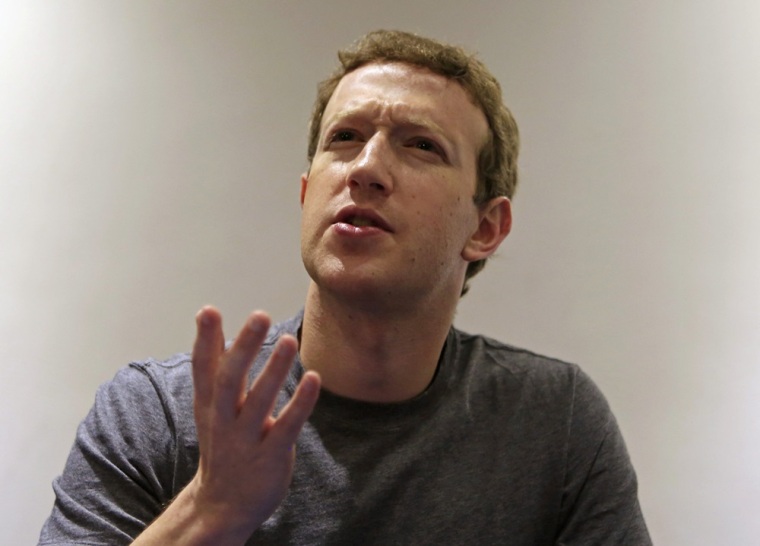Facebook Censors Prophet Muhammad Images Despite Mark Zuckerberg Promoting Importance Of Free Speech

Facebook has agreed to censor images of the prophet Muhammad in Turkey just two weeks after its chief executive officer, Mark Zuckerberg, posted a personal statement on Facebook about the importance of free speech with the hashtag #JeSuisCharlie, the Washington Post reported.
The images censored in Facebook include the very type of image that brought on the attack at the offices of French satirical weekly Charlie Hebdo.
"It's an illustration, perhaps, of how extremely complicated and nuanced issues of online speech really are. It's also conclusive proof of what many tech critics said of Zuckerberg's free-speech declaration at the time: Sweeping promises are all well and good, but Facebook's record doesn't entirely back it up," said the newspaper's Caitlin Dewey.
Zuckerberg publicly posted such declaration on Jan. 9 in his Facebook account. In his statement, Zuckerberg revealed that "a few years ago, an extremist in Pakistan fought to have me sentenced to death because Facebook refused to ban content about Mohammed that offended him."
"We stood up for this because different voices -- even if they're sometimes offensive -- can make the world a better and more interesting place," the Facebook CEO said.
"Facebook has always been a place where people across the world share their views and ideas. We follow the laws in each country, but we never let one country or group of people dictate what people can share across the world.
"Yet as I reflect on yesterday's attack [Charlie Hebdo in Paris] and my own experience with extremism, this is what we all need to reject -- a group of extremists trying to silence the voices and opinions of everyone else around the world.
"I won't let that happen on Facebook. I'm committed to building a service where you can speak freely without fear of violence.
"My thoughts are with the victims, their families, the people of France and the people all over the world who choose to share their views and ideas, even when that takes courage," Zuckerberg said.
Facebook agreed in December to censor the page of Alexei Navalny, a critic of Russia's President Vladimir Putin, as requested by Russian Internet regulators.
The website has been accused of taking down pages linked to dissidents in Syria and China.
The International Campaign for Tibet is currently gathering support for a petition against its censorship, with the petition drawing more than 20,000 signatures already.
 Christians don't have to affirm transgenderism, but they can’t express that view at work: tribunal
Christians don't have to affirm transgenderism, but they can’t express that view at work: tribunal Archaeology discovery: Medieval Christian prayer beads found on Holy Island
Archaeology discovery: Medieval Christian prayer beads found on Holy Island Presbyterian Church in America votes to leave National Association of Evangelicals
Presbyterian Church in America votes to leave National Association of Evangelicals Over 50 killed in 'vile and satanic' attack at Nigerian church on Pentecost Sunday
Over 50 killed in 'vile and satanic' attack at Nigerian church on Pentecost Sunday Ukrainian Orthodox Church severs ties with Moscow over Patriarch Kirill's support for Putin's war
Ukrainian Orthodox Church severs ties with Moscow over Patriarch Kirill's support for Putin's war Islamic State kills 20 Nigerian Christians as revenge for US airstrike
Islamic State kills 20 Nigerian Christians as revenge for US airstrike Man who served 33 years in prison for murder leads inmates to Christ
Man who served 33 years in prison for murder leads inmates to Christ


 Nigerian student beaten to death, body burned over ‘blasphemous’ WhatsApp message
Nigerian student beaten to death, body burned over ‘blasphemous’ WhatsApp message 'A new low': World reacts after Hong Kong arrests 90-year-old Cardinal Joseph Zen
'A new low': World reacts after Hong Kong arrests 90-year-old Cardinal Joseph Zen Iran sentences Christian man to 10 years in prison for hosting house church worship gathering
Iran sentences Christian man to 10 years in prison for hosting house church worship gathering French Guyana: Pastor shot dead, church set on fire after meeting delegation of Evangelicals
French Guyana: Pastor shot dead, church set on fire after meeting delegation of Evangelicals ‘Talking Jesus’ report finds only 6% of UK adults identify as practicing Christians
‘Talking Jesus’ report finds only 6% of UK adults identify as practicing Christians Mission Eurasia ministry center blown up in Ukraine, hundreds of Bibles destroyed: 'God will provide'
Mission Eurasia ministry center blown up in Ukraine, hundreds of Bibles destroyed: 'God will provide' Church holds service for first time after ISIS desecrated it 8 years ago
Church holds service for first time after ISIS desecrated it 8 years ago Burger King apologizes for 'offensive campaign' using Jesus' words at the Last Supper
Burger King apologizes for 'offensive campaign' using Jesus' words at the Last Supper Uganda: Muslims abduct teacher, burn him inside mosque for praying in Christ’s name
Uganda: Muslims abduct teacher, burn him inside mosque for praying in Christ’s name